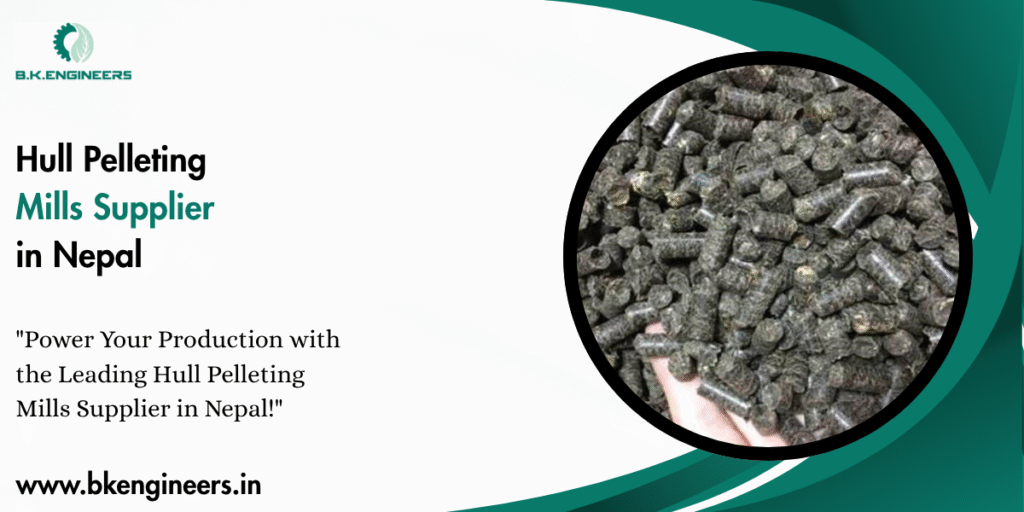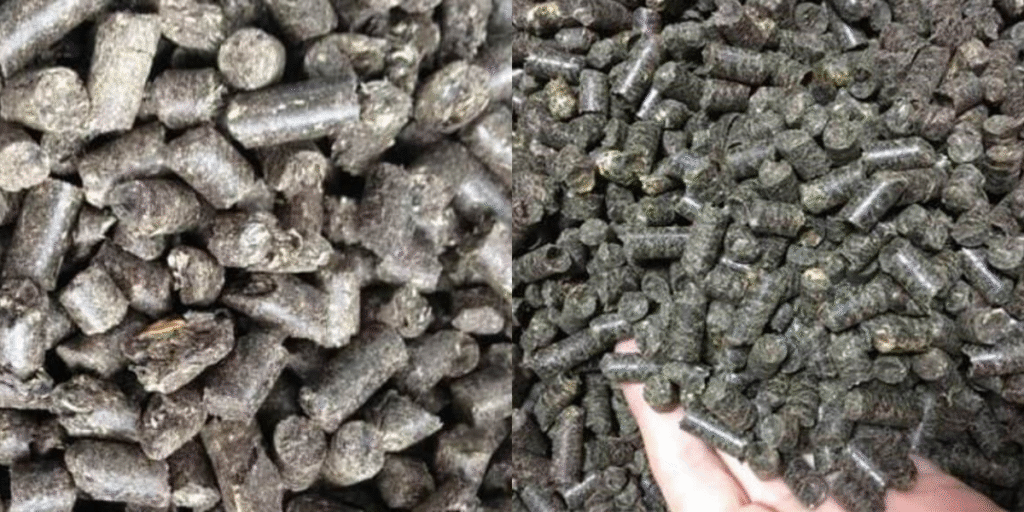Hull Pelleting Mills Supplier in Nepal

Table of Contents
Introduction
At B.K. Engineers, we specialize in manufacturing a wide range of mills designed to meet your diverse needs. Our expertise spans across Cattle Feed Mills, Poultry Feed Mills, Aquatic Feed Mills, Bran Pelleting Mills, Hull Pelleting Mills, Grass Pelleting Mills, Alfalfa Pellets Mills, Wood Pellets Mills, and Straw Pelleting Mills. With our state-of-the-art technology and commitment to quality, we ensure that you get the best equipment for your production needs.
In the agricultural and livestock industry, efficient feed production is essential for ensuring healthy livestock and maximizing productivity. Hull pelleting mills play a pivotal role in transforming raw agricultural by-products, like rice hulls, wheat husks, and other crop residues, into high-quality pellets suitable for animal feed. For businesses and farmers in Nepal, sourcing these machines from a trusted supplier is crucial. We are the best Hull Pelleting Mills Manufacturer.
This is where B.K. Engineers shines as a leading Hull Pelleting Mills Supplier in Nepal.The need for effective and superior pelleting equipment is growing in Nepal’s quickly expanding feed and agriculture sector. For farmers, feed producers, and industrial consumers looking to increase output, cut waste, and improve the quality of animal feed, hull pelleting mills have become indispensable equipment. B.K. Engineers is one of the most reputable suppliers of Hull Pelletizing Mills in Nepal, providing excellent machinery that is suited to regional requirements.
What Are Hull Pelleting Mills
A mechanical device called a hull pelleting mill is used to crush crop hulls into small pellets. These devices work using the high-pressure extrusion principle, in which raw materials are fed into a chamber, squeezed by dies or rollers, and formed into dense pellets. Because of its consistent size, density, and durability, the finished product is simpler to transport, store, and use as biomass fuel or animal feed. We are the best Hull Pelleting Mills Provider.
Why Choose B.K. Engineers
- Unmatched Product Quality and Durability: We source and provide Hull Pelleting Mills known for their rugged construction and high-grade components. These machines are engineered to perform consistently under the demanding conditions of Nepali feed mills. They are built to last for years, giving you a superior return on your investment.
- Extensive Local Inventory of Spare Parts: This is a game-changer. Unlike suppliers who import parts only after an order, we maintain a comprehensive inventory of critical spare parts like ring dies, rollers, bearings, and gears right here in Nepal. This means drastically reduced downtime for your business. When your machine needs a part, you get it in days, not months.
- Expert Technical Support and On-Site Installation: Our relationship doesn’t end at the sale. Our team of experienced engineers provides professional on-site installation to ensure your mill is set up perfectly from day one. We train your operators on how to use and perform basic maintenance on the machine, empowering your team for success.
- Robust and Responsive After-Sales Service: We pride ourselves on our dedicated after-sales service network. If you face an issue, a simple phone call is all it takes. Our technicians are spread across key regions and are committed to providing prompt, effective solutions to keep your production line running smoothly.
- Customized Solutions for Your Unique Needs: We understand that a one-size-fits-all approach doesn’t work. Whether you are a small-scale farmer cooperative or a large commercial feed mill, we offer a range of hull pelleting mill models with different capacities. We take the time to understand your specific output requirements and recommend the perfect machine for your budget and goals.
- Deep Industry Expertise and a Trusted Reputation: With years of service in the industry, B.K. Engineers has built a reputation founded on trust and reliability. We have helped countless agri-businesses across Nepal scale up their operations. Our success stories are our biggest credential.
- End-to-End Consultation and Customization: Your needs are unique. We begin with a consultation to understand your raw material, desired output, and business goals. We then recommend the perfect Hull Pelleting Mill model for your specific application. We help you plan for success from day one.
- Building Long-Term Relationships At B.K. Engineers, we see every client as a long-term partner. We are invested in your success because your growth is our growth. We are just a phone call away for any advice or support you may need. Our commitment is to be a reliable pillar for your business for years to come.
- Empowering Nepal’s Self-Reliance By choosing B.K. Engineers, you are not just buying a machine; you are supporting a company that is deeply committed to Nepal’s industrial and agricultural development. We are proud to be contributing to a greener, more self-reliant economy by providing technology that converts local waste into wealth.

Applications of Hull Pelleting Mills
1. Poultry Feed Production
- Poultry feed requires uniform pellets to ensure birds consume balanced nutrients. Hull pelleting mills make it easy to process maize, soybean, and hull-based feed into high-quality pellets that promote healthy growth.
2. Cattle and Livestock Feed
- Cattle and livestock feed often contains fibrous materials like rice hulls, wheat bran, and maize husks. Pelleting these ingredients improves digestibility and reduces feed loss, ensuring better weight gain and milk production.
3. Fish and Aquaculture Feed
- Aquaculture operations benefit from pelleted feed that does not dissolve quickly in water. Hull pelleting mills help produce durable pellets suitable for fish farms, ensuring feed efficiency and reduced wastage.
4. Agricultural By-product Utilization
- Many agricultural by-products, such as husks, bran, and hulls, often go unused. Hull pelleting mills allow farmers and manufacturers to convert these materials into valuable feed, reducing waste and increasing profitability.
5. Animal Feed Production
- Pellets made from rice hulls, maize husks, or other grains provide a nutritious and digestible feed for livestock such as poultry, cattle, and goats. Pelleting improves feed efficiency and reduces wastage, ensuring that animals get the maximum benefit from their diet.
6. Biofuel Production
- Biomass pellets made from agricultural residues serve as a sustainable energy source. Hull pelleting mills help convert waste materials into eco-friendly fuel for heating, cooking, and power generation, contributing to environmental conservation.
7. Industrial Applications
- Pellets are used in industries for compact storage, uniform combustion in boilers, and as raw material in certain manufacturing processes. Hull pelleting mills ensure consistent pellet quality, making them ideal for industrial purposes
Specification Table of Hull Pelleting Mills
| Feature | Specification |
|---|---|
| Material | Hull Pelleting Mills |
| Capacity | 200 kg/h – 500 kg/h |
| Power Requirement | 15 kW – 30 kW |
| Pellet Diameter | 4 mm – 8 mm |
| Die Material | High-grade alloy steel |
| Motor Type | Electric / Diesel options available |
| Operation Type | Automatic / Semi-Automatic |
| Weight | 500 kg – 1200 kg |
| Warranty | 1 year |
| Application | Poultry feed, cattle feed, fish feed, agricultural by-products |
| Special Features | Energy-saving design, durable construction, easy maintenance |
Benefits of Hull Pelleting Mills
- Animal Feed Production: This is the most common use. Pelleted feed is nutritionally uniform, meaning every bite an animal takes has the same mix of nutrients. It’s easier to store, transport, and reduces feed wastage by up to 15%, directly boosting the profitability of poultry, dairy, and fish farms.
- Biomass Fuel Production: Nepal has an abundance of agricultural waste—rice husk, sawdust, mustard stalks, and more. A pelleting mill can compress this waste into high-calorific value biomass pellets. These are a clean, efficient, and sustainable alternative to firewood and fossil fuels for industrial boilers, brick kilns, and even home heating.
- Reducing Environmental Waste: By converting agricultural residue into valuable pellets, we tackle the problem of open burning, which causes severe air pollution. Pelleting is a green technology that promotes a circular economy.
- Economic Opportunity: Starting a pelleting plant creates jobs. You can become a supplier of high-quality animal feed or biomass fuel, tapping into a growing domestic and international market.
- Durability and Longevity: Hull mills are built to last. They are constructed with high-quality materials and robust engineering, designed to withstand the demanding, continuous operation of a feed mill. This means less wear and tear and a much longer lifespan for your machine.
- Consistent Pellet Quality: The ultimate goal is a hard, durable pellet that doesn’t crumble easily. Hull’s precise engineering ensures consistent compression and temperature control, resulting in high-quality pellets that reduce waste (known as “fines”) during handling and transport.
- Energy Efficiency: In a country where electricity costs can be a significant overhead, an energy-efficient machine is a money-saving machine. Hull pelleting mills are designed to deliver maximum output for the power consumed, helping you keep your operational costs low.
- Reliable After-Sales Service: What happens when a part wears out or a minor glitch occurs? Your supplier must have a readily available stock of spare parts and a team of technicians who can provide prompt support.
- Easier Handling and Storage:Pellets are free-flowing and can be moved using automated conveyor systems. They don’t blow away in the wind like loose husk, creating a cleaner and more efficient work environment.
- Environmental Sustainability: By finding a productive use for agricultural waste, you are contributing to a circular economy. This reduces burning of husk (which causes air pollution) and promotes green energy.
Types of Hull Pelleting Mills
1. Flat Die Pelleting Mill
- Flat die pelleting mills are widely used due to their simplicity and efficiency. They consist of a flat die with holes through which the raw material is pressed by rollers to form pellets.
2. Ring Die Pelleting Mill
- Ring die pelleting mills are preferred for large-scale feed production. They feature a cylindrical die with rollers inside, which press the raw material through the die holes to produce pellets.
3. Biomass Pelleting Mills
- Biomass pelleting mills are designed for processing agricultural residues and hulls into fuel pellets, in addition to feed. These are increasingly popular for renewable energy production.
4. Electric Hull Pelleting Mill
- Electric hull pelleting mills are modern machines powered by electricity. They are convenient for small to medium feed factories where electricity supply is stable.
5. Diesel-Powered Hull Pelleting Mill
- For areas where electricity is unreliable, diesel-powered hull pelleting mills are a practical option. These mills offer mobility and flexibility without dependency on the electric grid.
Conclusion
Hull Pelleting Mills are now essential in Nepal’s quickly expanding feed and agriculture sectors; they are no longer a choice. They give farmers and feed makers more affordable options, improve feed quality, and cut waste. We are the Best Hull Pelleting Mills Supplier.
B.K. Engineers, a reputable supplier of Hull pelleting mills in Nepal, is dedicated to providing long-lasting, effective, and high-quality pelleting mills. We assist companies and farmers around Nepal in maximizing productivity and profitability with our tailored solutions, knowledgeable assistance, and affordable prices.

